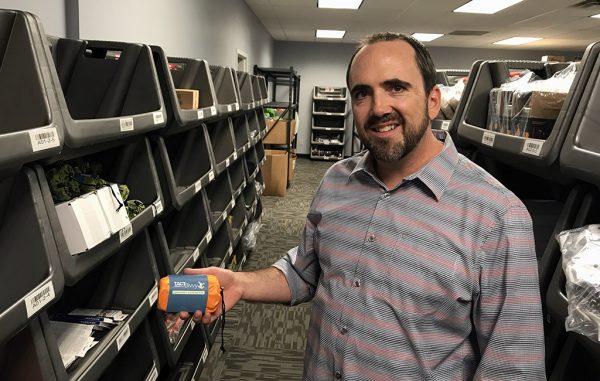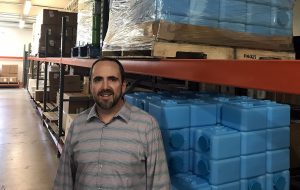Byron Walker runs a one-stop shop for the end of the world.
As CEO of Denver-based Survival Frog, Walker sells gadgets and gizmos for emergency scenarios: shoelaces that double as fire starters, a lantern that charges a cell phone, and jumper cables small enough to slip into your pocket.
The company prepares customers for the worst. And business keeps getting better.
Survival Frog reported revenue of $6.1 million last year, up 30 percent from 2015. Walker expects revenue to pop another 50 percent this year.
Some of the growth is thanks to outdoor enthusiasts, Walker said, who like buying products like a LifeStraw water filter or a sleeping bag that can fit into the palm of a hand.
So the company is preparing for even better times ahead. The 47-year-old Colorado native recently knocked down a wall at Survival Frog’s headquarters at 2488 W. Second Ave. It needs the extra space for operations and inventory, which the startup sells and ships, but doesn’t manufacture.
The following is an edited transcript.
BusinessDen: What inspired you to launch Survival Frog back in 2009?
Byron Walker: I was in real estate investment, which started to get difficult. I’ve always had a love for the outdoors, camping and the idea behind survival. I originally started off selling survival books, instant downloads and DVDs for almost five years.
We have 500 products that we ship from here. Best I can tell, we are the largest in the survival and preparedness industry when it comes to e-commerce sales. We launch about five new products every month. It’s a lot of work, and it continues to grow.
BD: Who would you say is your typical customer?
BW: We certainly do have a pretty big percentage of military or ex-military customers, Mormons, and we do have the guys out in the middle of nowhere with a bunker full of 30 years’ worth of food. Traditionally, our customers have been politically conservative. But since Trump won the election we have had a very big movement to the left.
The most typical customer we have is generally 55 years old or older, slightly more male than female, and your average middle-class family that lives in the suburbs. They’re not preparing for the zombie apocalypse.
BD: Do you see any sales spikes related to current events?
BW: One of our biggest years was in 2012 (the end date of the Mayan calendar). And our sales of potassium iodide, which helps with radiation from nuclear fallout, have gone through the roof in the last month or so because of tension with North Korea. We see different products have spikes in sales depending on what’s going on in the world.
BD: Have your products saved people’s lives?
BW: It’s really fulfilling when we hear people say, ‘Your product saved my butt.’ The most recent story was that someone had our free paracord grenade (a kit with a long cord and various attachments) we give to first-time website visitors. He had it in his bag, and he got stranded. He ended up using it to catch fish, because there’s a little fishing kit inside, and using the paracord to construct a little shelter.
BD: You encourage everyone to have enough supplies to survive for 72 hours. How much does this typically cost, and what supplies do you recommend?
BW: For 72 hours, it’s really not that expensive, certainly below $200, and you can probably do it for less than $100.
What that would entail is going to be water. Our water jugs won’t leak and they’re safe to use long term. Almost all of our food has a 25-year shelf life, so you can buy some of our canned beef – and I know it sounds gross, but it’s delicious.
Lighting of course is going to be important, and we have a lot of solar-lighting products.
If you’re in a very hot environment, it’s nice to have some cooling towels or strategies on cooling yourself. If you’re in a cold climate, you need strategies for heating. We sell a little sleeping bag that fits in the palm of your hand and will keep you toasty warm.
BD: What are your personal survival products and where do you keep them?
BW: Like most of our customers, I’ve got my stash. My whole thing is 60 days, and so we have enough water and everything else we need for that at my house. Outside of that, I’ve got (the Survival Frog) warehouse with a half-million dollars of stuff. And of course in both my cars, I have all the gear that we need, so if my wife is out and gets stranded she’s taken care of. If I am, same thing.
BD: Do you personally believe the world is going to end?
BW: No. I don’t have doomsday theories in my head, but I do believe that the grid could go down for a week or two, or worse, the water supply can be interrupted. Every night you watch the news, there’s a disaster somewhere. If that happened to me here, I’d be okay.
Byron Walker runs a one-stop shop for the end of the world.
As CEO of Denver-based Survival Frog, Walker sells gadgets and gizmos for emergency scenarios: shoelaces that double as fire starters, a lantern that charges a cell phone, and jumper cables small enough to slip into your pocket.
The company prepares customers for the worst. And business keeps getting better.
Survival Frog reported revenue of $6.1 million last year, up 30 percent from 2015. Walker expects revenue to pop another 50 percent this year.
Some of the growth is thanks to outdoor enthusiasts, Walker said, who like buying products like a LifeStraw water filter or a sleeping bag that can fit into the palm of a hand.
So the company is preparing for even better times ahead. The 47-year-old Colorado native recently knocked down a wall at Survival Frog’s headquarters at 2488 W. Second Ave. It needs the extra space for operations and inventory, which the startup sells and ships, but doesn’t manufacture.
The following is an edited transcript.
BusinessDen: What inspired you to launch Survival Frog back in 2009?
Byron Walker: I was in real estate investment, which started to get difficult. I’ve always had a love for the outdoors, camping and the idea behind survival. I originally started off selling survival books, instant downloads and DVDs for almost five years.
We have 500 products that we ship from here. Best I can tell, we are the largest in the survival and preparedness industry when it comes to e-commerce sales. We launch about five new products every month. It’s a lot of work, and it continues to grow.
BD: Who would you say is your typical customer?
BW: We certainly do have a pretty big percentage of military or ex-military customers, Mormons, and we do have the guys out in the middle of nowhere with a bunker full of 30 years’ worth of food. Traditionally, our customers have been politically conservative. But since Trump won the election we have had a very big movement to the left.
The most typical customer we have is generally 55 years old or older, slightly more male than female, and your average middle-class family that lives in the suburbs. They’re not preparing for the zombie apocalypse.
BD: Do you see any sales spikes related to current events?
BW: One of our biggest years was in 2012 (the end date of the Mayan calendar). And our sales of potassium iodide, which helps with radiation from nuclear fallout, have gone through the roof in the last month or so because of tension with North Korea. We see different products have spikes in sales depending on what’s going on in the world.
BD: Have your products saved people’s lives?
BW: It’s really fulfilling when we hear people say, ‘Your product saved my butt.’ The most recent story was that someone had our free paracord grenade (a kit with a long cord and various attachments) we give to first-time website visitors. He had it in his bag, and he got stranded. He ended up using it to catch fish, because there’s a little fishing kit inside, and using the paracord to construct a little shelter.
BD: You encourage everyone to have enough supplies to survive for 72 hours. How much does this typically cost, and what supplies do you recommend?
BW: For 72 hours, it’s really not that expensive, certainly below $200, and you can probably do it for less than $100.
What that would entail is going to be water. Our water jugs won’t leak and they’re safe to use long term. Almost all of our food has a 25-year shelf life, so you can buy some of our canned beef – and I know it sounds gross, but it’s delicious.
Lighting of course is going to be important, and we have a lot of solar-lighting products.
If you’re in a very hot environment, it’s nice to have some cooling towels or strategies on cooling yourself. If you’re in a cold climate, you need strategies for heating. We sell a little sleeping bag that fits in the palm of your hand and will keep you toasty warm.
BD: What are your personal survival products and where do you keep them?
BW: Like most of our customers, I’ve got my stash. My whole thing is 60 days, and so we have enough water and everything else we need for that at my house. Outside of that, I’ve got (the Survival Frog) warehouse with a half-million dollars of stuff. And of course in both my cars, I have all the gear that we need, so if my wife is out and gets stranded she’s taken care of. If I am, same thing.
BD: Do you personally believe the world is going to end?
BW: No. I don’t have doomsday theories in my head, but I do believe that the grid could go down for a week or two, or worse, the water supply can be interrupted. Every night you watch the news, there’s a disaster somewhere. If that happened to me here, I’d be okay.



Leave a Reply